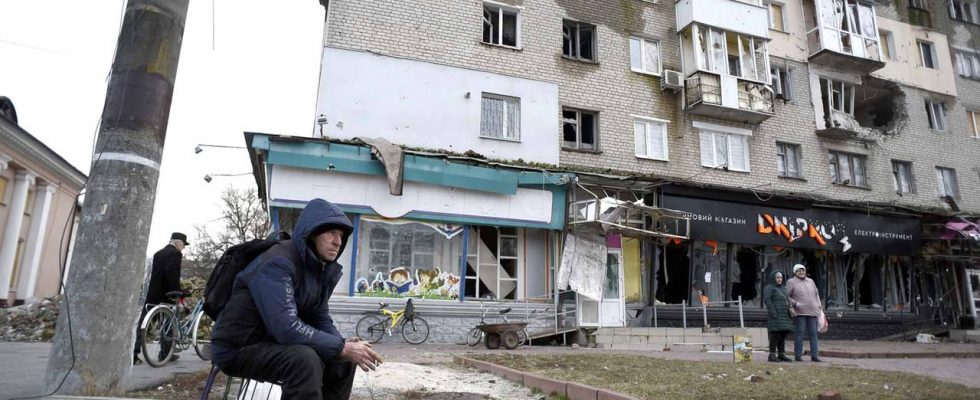report
The Ukrainian city of Izjum was in Russian hands for six months and was liberated more than a year ago. But the destruction and mining during this time still characterize everyday life – as well as mutual mistrust.
Serhij and Denys are making slow progress with their metal detectors. The two soldiers from the Ukrainian demining team check a remote access road to Izyum for anti-personnel and anti-tank mines so that work on the power grid can continue. Before winter fully sets in, at least a few of the houses destroyed by the Russian armed forces should be repaired.
“The Russians mined everything, cemeteries, the forests, the rivers and of course the farmland,” explains Denys. “There are booby traps everywhere here. And they have laid trip wires, which is forbidden under the Geneva Convention.” It’s a mammoth task to remove all of this.
A city in ruins
Izyum, the northern gateway to the Donbas industrial region, is one of the most bombed cities in Ukraine, explains deputy mayor Volodymy Matsokin in his makeshift office. 80 percent of the buildings have been destroyed, and the town hall is also in ruins.
Hatched: territories occupied by Russia
At least electricity and water are now flowing again in almost all inhabited houses. And for warmth in winter, the city bought containers with mobile pellet heaters.
Before the war there were eleven schools in Izjum and almost all of them were damaged, six were totally destroyed. And Matsokin’s sad conclusion was that there were no resources to restore it. “Most of the shops in the city are closed and the Russians have taken everything they could use: tractors, bulldozers and garbage trucks,” he continues.
Deep distrust
So much for the visible war damage. But the mistrust among people is almost even more serious, complains Matsokin. For six months, from March to September 2022, the Russians occupied the city and carried out a reign of terror.
“We knew what the Russians were doing in the occupied territories, because Russia has been occupying parts of Ukraine since 2014, and we had been documenting reports from refugees for years,” says the mayor. “But it’s something different when you experience it first hand.” Survivors report real manhunts of civilians and rapes.
Many ended up cooperating with the Russians out of fear of the occupiers, explains Matsokin. “Here people were killed for fun, just because the Russians wanted to demonstrate their power. People were killed just because they asked to get their cell phones back.” Others, on the other hand, simply cooperated, is his sad conclusion.
The processing has only just begun
Outside Amid the rubble, calls to pass on information about collaborators to the Ukrainian secret service SBU are spray-painted on the walls. In his office, Matsokin collects information against teachers and officials. “It’s not an easy process and it’s very painful,” he explains. Many documents were burned. “So we have to rely on the statements of those affected.”
This will take years, just like in Germany, where people who had collaborated with the Nazis were identified decades later. “But those who committed these crimes against our people must one day be held accountable.”
Destructions and provocations
The diary of the then 50-year-old Ukrainian writer and children’s book author Volodymyr Vakulenko gives an impression of the horror of those six months under Russian occupation.
From his notes, which he buried in his garden during the occupation, it appears that he was denounced. In it, Vakulenko describes how he and his neighbors were provoked by Russians whenever they stood together around the fire. “We will build a different Ukraine,” they would have shouted.
“They are mocking us,” Vakulenko writes in his notes. “They destroy our houses and pretend to be protectors. And unfortunately they intimidate some people and they then collaborate.” Vakulenko writes several times about his fear of being betrayed.
On March 24, 2022, Russian soldiers took him from his house. Neighbors later tell how he and his son were kidnapped by Russian soldiers on a bus marked with a “Z” and never returned.
His body was later found in a mass grave along with more than 400 other dead and identified using DNA analysis. His diary is now in the Kharkiv Literary Museum.
New beginnings with a café
11,000 people have returned to Izjum so far. So do Hanna and Ivan Ovcharenko, both in their early twenties. Together they opened a café 60 km from the front.
They know that the new beginning will be difficult, but they still want to help rebuild the city. After all, they grew up here.
“We want to encourage people to talk to each other,” explains the 21-year-old Ivan Ovcharenko, “and give them hope for a better future.”
The residents and also the soldiers from the front come to the café to refuel, explains his wife. “They enjoy the relaxed atmosphere here and the delicious coffee. They haven’t had one like this for a long time.”
The dream of returning
A topic that the guests in Hanna and Ivan’s café also talk about: An online campaign called “I will return” has been running since September.
People from Izjum who have fled all over the world describe what has happened to them since the occupation and send photos. They write about how they miss their homeland and would give anything to swim in the Siverskiy Donets River and touch the land.
The fear remains
Those who survived the occupation in Izjum are marked. Most are very thoughtful. Others full of anger. Many are afraid that the Russians could return.
“But they are slowly getting back on their feet,” say Hanna and Ivan. This process will not be easy, they fear, especially since another harsh winter is ahead. But the young couple wants to stay in Izjum. They firmly believe in new beginnings.
You can see these and other reports in the lunchtime magazine – today at 1 p.m. on Erste.

